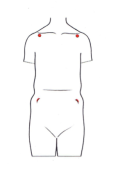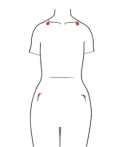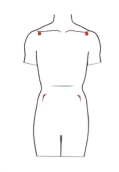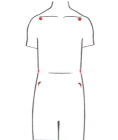 During the many years I have served as a health practitioner there have been some patients sensitive to supplementation. It has been my experience that these people have a hidden or silent condition that they may not recognize until they try to change their normal food habit. To explain this many of us get into a habit of eating certain foods every day and our choice is based upon what we “like” or how it makes us “feel”. You probably have heard the term “comfort foods”.
During the many years I have served as a health practitioner there have been some patients sensitive to supplementation. It has been my experience that these people have a hidden or silent condition that they may not recognize until they try to change their normal food habit. To explain this many of us get into a habit of eating certain foods every day and our choice is based upon what we “like” or how it makes us “feel”. You probably have heard the term “comfort foods”.
One of my earned degrees is in Dietetics. I was suspicious that food played a role in disease issues. However, contrary to what I was taught I found it hard to accept the theory that all food is good for everyone nor could we all digest the food properly. I never lost my drive to understand why one mans food is another mans poison. This goes back to the years I spent in researching Biochemical Individualism. The scientific truth is that each and every one of us has to discover his or her own personal safe diet. I have tried to make it easy for my patients by teaching them their Diet Type.
Today, fortunately, there is a growing awareness that correct eating and good health go hand in hand. With the discovery of food allergies and/or genetic food intolerance and the recognition of their widespread harmful effects, the door has been opened for the cure of a wide variety of diseases. It has been estimated that over half of all illnesses reported to doctors are caused or worsened by toxic foods, so this condition is not rare.
An allergy to the food you are eating every day can take the edge off your enjoyment of life, can cause you to feel under the weather without anything definite to complain about or can actually be the cause of severe inexplicable illness. But the vast majority of people do not know that this is what is happening to their bodies and their state of mind. They simply accept that mystery symptoms which come and go are just normal.
Can you have a hidden allergy or food incompatibility?
It is common for us to think of food allergy in terms of the type of illness which results from an allergy to nuts, strawberries or shellfish. These foods, however, are not eaten on a day-to-day basis, and the violence of the reaction when encountered leaves little opportunity for the source of the illness to remain unsuspected.
Officially, figures still claim that food allergy affects only between 1% and 7% of the population. These statistics are misleading since they concern only extremely violent food reactions that are “immediate hypersensitivity” and which can lead to anaphylaxis and death.
There is an entirely different clinical picture when the food to which you are allergic is a staple item of your diet that you eat every day of your life, perhaps several times each day. Under these circumstances, the body adapts to the allergic process and the reaction disappears to become a masked or silent allergy. This adaptation of the body may last a lifetime or may become exhausted at any time under stress. When the adaptation by the body is complete there are no symptoms, but if the strain of coping with the allergy wears down the adaptive process then a whole variety of symptoms can show up.
Any bodily system can be upset by food allergy or genetic food intolerance and in any person one or more systems can be involved. Incidentally, even the targeted system involved can change from one period of life to another. Example: A child with eczema moves on to asthma, then grows out of asthma and develops irritable bowel syndrome. Stress helps to exhaust the adaptive process of the body and aggravate the symptoms. This often makes it appear as though stress is the cause of the trouble. The patient may have to endure psychotherapy, and when this fails to cure the trouble, drugs may be used to suppress the symptoms. Remember that individuals can express their conditions differently.
It has been my experience that these are the very people who are reactive to supplemental digestive enzymes when they try to take them.
Consider the results of silent inflammation that has been masked for years. Now you now decide to add supplemental digestive enzymes to properly breakdown these foods. How may your body react to the change? If your toxic food is a protein the reaction of pain may be in the stomach. If it is a lipid (fat) derivative you may have nausea as in gallbladder or even diarrhea. If it is a carbohydrate it may show up as bloating and/or gas. If it several different foods, then the liver is involved and you may have night sweats and or migraines.
What can you do if you have a reaction?
In my practice I determined their type and we adjusted their diet. I gave them the supplemental digestive formula for sensitive people and followed it with a formula to smooth the digestive tract along with a sensitive probiotic formula to assist in their microbial balance. They stayed on the sensitive protocol until they could graduate to the stronger formula for balancing.
If you can’t see a Transformation trained practitioner, then you can read my book and determine your type and follow the food choices in the book. “The Healing Power of Enzymes” has been updated during 2015.
Another suggestion you might not to want to hear is to take as many digestive enzymes your body requires to make the reaction stop. This isn’t very popular but some people who are afraid of the supplementation may take so few they just stir up their problem. The truth is they need more than the average person to begin with.



 Written by Georgia Ede MD.
Written by Georgia Ede MD.






